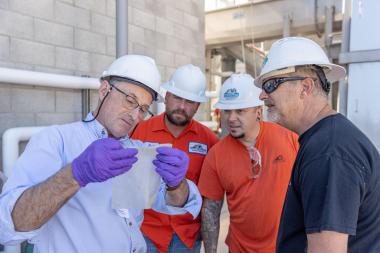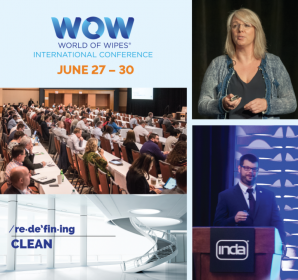California’s Largest Sewage Collection Study: Wipes Clogging the Pipes?
In accordance with California’s Proper Labeling of Wet Wipes law (AB 818), state wastewater agencies and industry experts went deep to find out exactly what is passing through—and clogging up—municipal wastewater systems. The Responsible Flushing Alliance (RFA) alongside the California Association of Sanitation Agencies (CASA) and the Association of the Nonwoven Fabrics Industry (INDA) released the results from the largest known domestic sewage collection study conducted to reveal what’s really being flushed down the drain – and shouldn’t be.
“We took a forensic approach to this collection study, engaging industry and wastewater experts to examine our findings and determine what exactly is being flushed and how much of it,” said Adam Link, Executive Director at CASA, a co-sponsor of the Proper Labeling of Wet Wipes Law. “Now that we have the data to see what Californians are flushing and the types of non-flushable items that are causing issues within wastewater systems, local agencies can refine their public outreach and messaging to target specific problems and educate more efficiently.”
Collection and material investigation took place in October 2023 at two locations: Inland Empire Utilities Agency (IEUA) in Southern California and Central Contra Costa Sanitary District (Central San) in the greater San Francisco Bay Area in Northern California. Wastewater and wipes experts collected, sorted and identified more than 1,700 items pulled from the two locations during peak flow times. Kennedy Jenks, an independent engineering firm, designed the study and compiled the findings into the report.
Why Study What’s Being Flushed?
When products that aren’t meant to be flushed down the toilet wind up in the sewer system, it can cause serious threats to public and environmental health. In fact, estimates show that local public agencies throughout California (and the ratepayers they represent) are spending more than $47 million annually to repair wastewater treatment equipment and respond to sewer overflows caused by improper flushing.
“Part of keeping communities healthy requires not flushing things we shouldn’t,” said Lara Wyss, President of the RFA. “However, the data to support which non-flushable items to target as part of education campaigns has been lacking. That’s likely why when we surveyed Californians about what they are flushing, the results revealed that approximately 25% think baby wipes are flushable (which is never true) and 60% self-reported that they flushed something they knew they shouldn’t have.2 Our study results reinforce that finding, as more than 99% of materials collected were items that shouldn’t have been flushed.”
The breakdown of items collected from pipes at the two study locations included:
• 34.1% wipes labeled with the “Do Not Flush” symbol (baby wipes, cleaning wipes, makeup wipes, etc.)
• 64.9% other non-flushable items (paper towels, period products, trash, etc.)
• 0.9% wipes labeled as flushable
“We pulled material larger than 1-inch square directly from the bar screens, and it wasn’t until everything was sorted and identified that we could see what we actually had,” said Matt O’Sickey, Director of Education and Technical Affairs, INDA. “There were a lot of paper towels and baby wipes and all of the ‘Do Not Flush’ labeled wipes we collected were fully intact, showcasing why they should never be flushed.”
What Not to Flush—and How We Tell Consumers
According to the Proper Wet Wipes Labeling law, manufacturers of non-flushable wipes, including products such as baby wipes, cleaning wipes, makeup removal wipes and many others that are primarily used in a bathroom setting must include the “Do Not Flush” symbol on the front of the packaging.
The #FlushSmart consumer education campaign promotes the “Do Not Flush” symbol and provides information on what should and should not be flushed. The message shared with consumers is simple: Look for the “Do Not Flush” symbol on wipes packaging, and if you see it – throw the wipe out. Extrapolating from the results of this study, refraining from flushing “Do Not Flush” labeled wipes, paper products and feminine hygiene products would capture over 90% of items clogging sewers.
INDA













